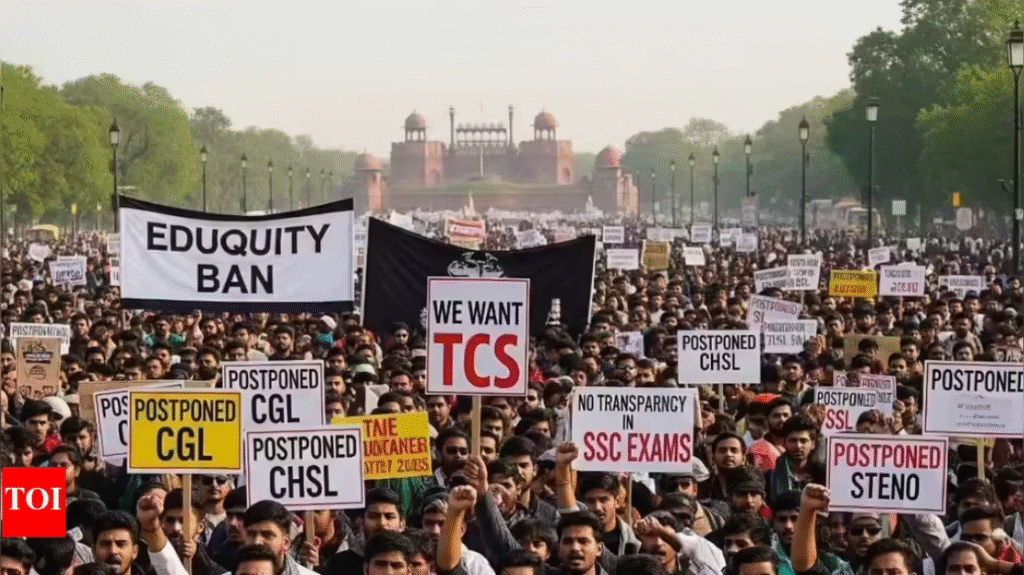As national outrage over SSC Phase‑13 (Selection Post) mismanagement continues, the Commission announced that the exam will not be cancelled for all candidates. Instead, retests are expected for approximately 2,500 students impacted by glitches and administrative errors at select centres. This comes after weeks of protests under the hashtag #SSCMisManagement, involving students and educators such as the widely followed “Neetu Mam”.
🏫 Background: Why the Fury?
Over 5 lakh candidates appeared in SSC’s Phase‑13 exam held between July 24 and August 2. Technical breakdowns including system crashes, incorrect centre allocation, biometric failures, and abrupt cancellations led to nationwide outrage. Viral footage from SSC centres in Delhi and Indore appeared to show maltreatment and chaos, leading thousands to march under slogans like “justice-for-aspirants”.
📣 SSC’s Statement on Retests: Legal Dimensions
SSC Chairman S Gopalakrishnan affirmed that:
- The exam will proceed for the majority of students.
- Retests will be offered to students who were directly affected by glitches.
- If even one candidate was wronged, SSC would consider a retest.
SSC also pledged to investigate vendor failures, implement AI checks, and revisit vendor contracts to ensure future fairness.
🧠 Legal Commentary: Does the Retest Fulfill Justice?
✔️ Rule of Fair Procedure
Under administrative-law principles—especially audi alteram partem—everyone affected should receive fair notice and opportunity. A blanket retest for all may be excessive, but selective retest raises concerns: Can affected candidates prove loss of time or opportunity? What if they cannot attend retests due to geography or personal constraints?
❌ Equal Treatment & Transparency
Legal experts argue that fairness demands clarity: Will retests use the same syllabus and difficulty level? Will retest schedules accommodate those earning a living, differently‑abled, or residing far from exam centres?
🔍 Judicial and Political Scrutiny
- AAP MP Sanjay Singh introduced a demand in Rajya Sabha for parliamentary investigations into SSC irregularities.
- Government ministers, including Jitendra Singh, assured re-exam access for eligible candidates and full fee refund—debts in transparency and legal procedure cannot be ignored.
🧯 Protests & Repression
On July 31, protesters gathered at Jantar Mantar and CGO Complex despite calm aims. Reports suggest police used lathi-charge on aspirants; some were detained. Civil rights groups such as SIO condemned this as suppression rather than engagement.
📌 Key Issues Needing Legal Attention
| Area | Key Legal Question |
|---|---|
| Retest eligibility | Criteria and fairness for inclusion/exclusion |
| Official notification | Whether SSC followed mandated due process and transparency |
| Vendor accountability | Terms of contract, penalty clauses for failures |
| Protest rights | Legality of police actions, FIRs against aspirants |
| Judiciary’s role | Prospects for PILs or writ petitions challenging SSC policy |
✅ Next Steps & Emerging Trends
- Affected aspirants should document email confirmations, screenshots, and police complaints related to disruptions.
- Student associations may file writ petitions to obtain specific retest schedules or vendor replacements.
- Policy experts foresee delegated parliamentary inquiries and demand judicial scrutiny of SSC’s AI safeguard roadmap.
🔚 Conclusion
The SSC’s latest announcement offers partial resolution—but not full justice. Legal legitimacy hinges on how SSC defines “affected candidates,” delivers consistent retest mechanisms, and reforms contracting and tech protocols. As protests continue, the movement demands clarity, enforcement of candidate rights, and government accountability.
To read more Indian Laws and news, visit Legal Guide India



